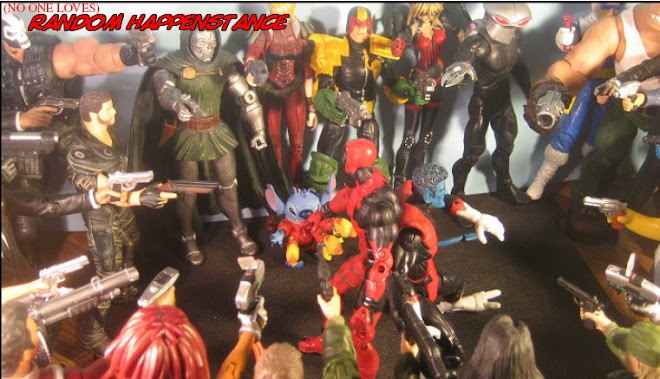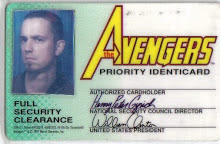Monday, November 27, 2023
This sounds like a boilerplate sci-fi adventure pitch: a soldier put in cryogenic freeze, to wait for the aftermath of nuclear war. Then he would execute the last orders of the last President of the United States, to either restore order, or exact retribution, as the "Apocalypse Commander." It doesn't go as planned, and this series might not be what you would expect. From 1990, The Last American #1-4, written by Alan Grant and John Wagner, art by Michael McMahon.
Disgraced soldier Ulysses S. Pilgrim is offered a final goodbye with his wife and son, before being interred in a cryogenic chamber in upstate New York. Twenty years after the bombs drop, Ulysses is revived, on July 4, 2019; by his three helper robots, Able, Baker, and Charlie. (That feels like a nod to another apocalyptic story, Silent Running.) With a fancy uniform, weapons, and a tank Judge Dredd would appreciate, they start exploring what's left of America in search of survivors.
The second issue is a nightmarish musical, in the ruins of New York City, as Bert the Turtle and the ghosts put on quite a show; although that might be more for the reader than Ulysses: Wagner and Grant might've swung for a musical issue more than once, and I'm not sure those were their best-received stories, but it feels like something they liked trying every so often. Ulysses visits Sing Sing, and finds records of the warden executing all the prisoners, since "they could hardly risk allowing hardened criminals to run loose." (That scene is echoed in Garth Ennis's Punisher: the End; and a pull quote from Ennis is on the cover of the trade!)
Of the three robots, Charlie is the most personable, as he seemed to have watched way too much TV during his wait in the bunker; and he was more tasked with keeping Ulysses sane then his fellows. Twice he lets Ulysses have a bottle, in the hopes to releasing some pressure, but after a rotten day in the city topped off with a visit to the fallen Statue of Liberty, Ulysses shoots up a derelict church, cursing out God, and has had about enough of his mission. He's ready to check out, but before he can pull the trigger, Charlie picks up a transmission, calling for him, the "deep reserve" unit. Is he the Last American...?
This series would've hit the shops October 9, 1990; the same month that Germany reunified. The threat of nuclear war probably didn't completely go away and probably never will, but it would've felt further away then, like a bad dream. A gloomy read, but a good one.
Subscribe to:
Post Comments (Atom)







4 comments:
I have to say, your tag "Your Apocalypse says a lot about you" is so criminally dead on it's not funny.
I'm definitely intrigued to read this one now, so thanks for that. I have a feeling besides the Beatles reference, you can really tell an Englishman wrote this. Still on board tho.
Wonder what a British version of this would look like....
Yeah, this is a good one, even if it’s supposedly the story that broke up the Wagner/Grant partnership. They would work together occasionally after this (they were doing stuff even shortly before Grant died), but they were never as close or in sync as before. I don’t know all the details but they just kept getting into big disagreements over how dark to go (it was happening with their 2000 AD stuff as well but not as badly) and it became almost torturous to get through.
They’d do musical episodes quite a bit for 2000 AD actually (especially around this time, but since the beginning of the partnership basically), and response was mostly positive. The ones that didn’t go over as well tended to be based on ‘flash in the pan’ musicians and styles.
They apparently like this one a lot in England, since it’s one of the few stories 2000 AD outright bought the rights to and sell in their web shop that was created exclusively for the American market and they had no input on.
I think I'd seen them do musical episodes in ROBO-HUNTER? Those would be mildly confusing for me, because while MAD might pull that once in a while, you don't see it often in American comics. (I do know there was a musical issue of DEADPOOL a couple years back...I don't think it was a highwater point there.)
Were Grant and Wagner fairly close, or were they more like Lee & Kirby...or Lennon & McCartney, for that matter: not necessarily pals?
I didn't get into it in the post, but there's a sequence in the third issue, where I was like yeah, I can see why Garth Ennis dug this. Like it's a piece of his creative DNA there.
I think it has to do with the difference between the history of American comics and British comics. British comics are almost always weekly and are more based on the political cartoons from the Opinion page. American comics are mostly monthly and are more based on the Sunday color comics.
Also, vaudeville was more popular and around longer in England so sing-alongs are more ingrained in their culture. A lot of Pat Mills stuff has musical interludes as well. Most of the Wagner/Grant musical stuff is in specials and from a period of 2000 AD after most of the US reprint series.
From what I’ve heard, Wagner and Grant were pretty close during the period that they worked together. Wagner would regularly stay in Grant’s guest house when they were writing and they’d be continually bouncing ideas off each other. They’d even act out the story to see what worked and what didn’t. They usually split the checks no matter who got the credit. They were writing so many of the stories that the publisher told them to divide up the credit, and even then they needed to use pseudonyms for a few stories.
Like I said, they still worked together afterwards but not like they used to. The story is that, one day around that time Grant came into the publishing offices and there was a note from Wagner saying that they should divide up the regular series they were working on- Grant got Strontium Dog and Judge Anderson and Wagner got Dredd. I think the next time they worked together was for a crossover.
Post a Comment